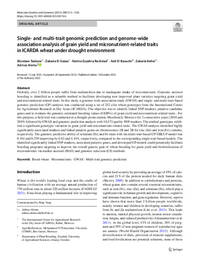Single- and multi-trait genomic prediction and genome-wide association analysis of grain yield and micronutrient-related traits in ICARDA wheat under drought environment

Authors:
Globally, over 2 billion people suffer from malnutrition due to inadequate intake of micronutrients. Genomic-assisted breeding is identified as a valuable method to facilitate developing new improved plant varieties targeting grain yield and micronutrient-related traits. In this study, a genome-wide association study (GWAS) and single- and multi-trait-based genomic prediction (GP) analysis was conducted using a set of 252 elite wheat genotypes from the International Center for Agricultural Research in Dry Areas (ICARDA). The objective was to identify linked SNP markers, putative candidate genes and to evaluate the genomic estimated breeding values (GEBVs) of grain yield and micronutrient-related traits.. For this purpose, a field trial was conducted at a drought-prone station, Merchouch, Morocco for 2 consecutive years (2018 and 2019) followed by GWAS and genomic prediction analysis with 10,173 quality SNP markers. The studied genotypes exhibited a significant genotypic variation in grain yield and micronutrient-related traits. The GWAS analysis identified highly significantly associated markers and linked putative genes on chromosomes 1B and 2B for zinc (Zn) and iron (Fe) contents, respectively. The genomic predictive ability of selenium (Se) and Fe traits with the multi-trait-based GP GBLUP model was 0.161 and 0.259 improving by 6.62 and 4.44%, respectively, compared to the corresponding single-trait-based models. The identified significantly linked SNP markers, associated putative genes, and developed GP models could potentially facilitate breeding programs targeting to improve the overall genetic gain of wheat breeding for grain yield and biofortification of micronutrients via marker-assisted (MAS) and genomic selection (GS) methods.
